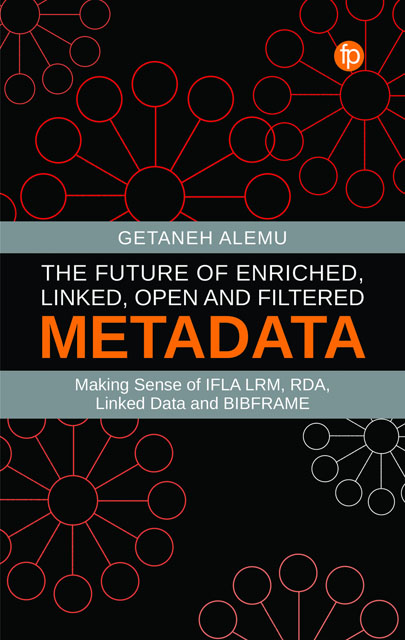 The Future of Enriched, Linked, Open and Filtered Metadata
The Future of Enriched, Linked, Open and Filtered Metadata Published online by Cambridge University Press: 18 November 2022
Overview
This chapter reviews contemporary cataloguing andmetadata principles, critiqued, with gaps identifiedand recommendations offered. Informationorganisation – which commonly has sub-branches suchas cataloguing, classification, taxonomies, indexingand retrieval – is underpinned by foundationalprinciples (Alemu, 2018; Alemu and Stevens, 2015;Alemu et al., 2014; Gartner, 2016; IFLA, 2009;Svenonius, 2000; Wright, 2007; Wright, 2014; Zengand Qin, 2016). Some of these fundamental principlesinclude the principle of sufficiency and necessity,the principle of user convenience, representation,and standardisation (Svenonius, 2000). However, dueto the development of electronic informationservices, the internet, the web, Web 2.0 and LinkedData on the one hand and the ever-growing demandsfrom users, some, if not all, of these principles,fall short of addressing these emergingrequirements. As Svenonius (2000) noted, theeffectiveness of information organisation andefficient provision of information services relieson the intellectual foundation that undergirds it.What would often be considered a menial, repetitiveand pedantic task of cataloguing has centuries ofaccumulated theories, methodologies and practices(Denton, 2007). It suffices to see the works ofCutter, Panizzi, Ranganathan and Lubetzky. Aconceptual framework and a set of interrelatedprinciples are required to develop a metadata modelthat can help guide the practice of metadatacreation, management and application. Practicalmetadata decisions carry philosophical, ethical andsubjective decisions (Weinberger, 2007).
In contrast, the four metadata principles of enriching,linking, openness and filtering claim that metadatacreation and enriching happen at various stages ofthe information resource lifecycle, involvingseveral actors, including users. This theory is notmerely user-centred but also user-driven. Metadatacreation and enhancement is a continuous processinvolving authors, publishers, suppliers, librariansand users. These principles posit a shift from thefocus of metadata simplicity to metadata enriching,from human-readable metadata to structured, uniquelyidentified and interlinked metadata (metadatalinking) and from metadata silos to metadataopenness, enabling metadata sharing and reuse. Thischapter covers both contemporary and emergingmetadata principles.
Due to a seismic shift in the development of electronicinformation services, the internet, the web, Web 2.0and Linked Data on the one hand and the ever-growingdemand from users for an instant, convenient, 24/7and seamless access to relevant full-textinformation services and resources, on the otherhand, some of the old metadata principles fail toscale and guide the new requirements.
To save this book to your Kindle, first ensure no-reply@cambridge.org is added to your Approved Personal Document E-mail List under your Personal Document Settings on the Manage Your Content and Devices page of your Amazon account. Then enter the ‘name’ part of your Kindle email address below. Find out more about saving to your Kindle.
Note you can select to save to either the @free.kindle.com or @kindle.com variations. ‘@free.kindle.com’ emails are free but can only be saved to your device when it is connected to wi-fi. ‘@kindle.com’ emails can be delivered even when you are not connected to wi-fi, but note that service fees apply.
Find out more about the Kindle Personal Document Service.
To save content items to your account, please confirm that you agree to abide by our usage policies. If this is the first time you use this feature, you will be asked to authorise Cambridge Core to connect with your account. Find out more about saving content to Dropbox.
To save content items to your account, please confirm that you agree to abide by our usage policies. If this is the first time you use this feature, you will be asked to authorise Cambridge Core to connect with your account. Find out more about saving content to Google Drive.